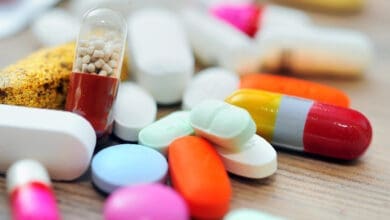The Pharmaceutical Manufacturers Association of Ghana (PMAG) has urged the government to take decisive action to recover millions of dollars owed by West African countries for medicines supplied by Ghanaian companies. The association warned on Wednesday that continued payment delays could cripple local pharmaceutical businesses and undermine Ghana’s ambition of becoming a regional pharmaceutical hub.
Speaking to the media in Accra on November 6, 2025, Dr Samuel Amo Tobbin, Executive Chairman of the Tobinco Group of Companies and President of PMAG, revealed that debts owed by several Sahel countries have become a major concern for local manufacturers. He clarified that governments in the region, not private individuals, owe the substantial amounts.
Dr Tobbin stated that the debts are owed by governments of Burkina Faso, Mali, Senegal, Côte d’Ivoire, and other countries in the subregion, except Nigeria. The president is talking about Ghana becoming a pharmaceutical hub, he noted, explaining that manufacturers who have started supplying and distributing products to the subregion expect the substantial money owed to them should be recovered.
The PMAG president declined to mention exact figures, stating it is not about individual debtors in the country. However, he emphasized the amounts are significant enough to threaten the viability of local pharmaceutical operations if left unresolved.
Dr Tobbin appealed to the Ghanaian government to intervene at the highest level to facilitate fund recovery, suggesting that collaboration between heads of state could help resolve the issue. He expressed hope that President John Dramani Mahama or Parliament could support manufacturers by coordinating with counterparts in debtor countries to secure payment.
The call for government intervention comes as Ghana positions itself to become a pharmaceutical manufacturing center for West Africa and beyond. President Mahama has emphasized developing local pharmaceutical capacity as part of his administration’s economic strategy, making debt recovery critical for industry sustainability.
Dr Mark Kurt Nawaane, Chairman of Parliament’s Health Committee, acknowledged the challenges faced by the local pharmaceutical industry and promised that the Committee would engage key stakeholders to find a sustainable solution. His response signals parliamentary willingness to address the mounting debt crisis threatening local manufacturers.
Ghana’s pharmaceutical sector has expanded significantly over the past decade, with local companies increasingly supplying medicines to neighboring countries. The Pharmaceutical Manufacturers Association of Ghana serves as the umbrella organization for 25 pharmaceutical companies operating in the country, dedicated to promoting growth, innovation and sustainability of the local industry.
The industry’s regional expansion aligns with Ghana’s broader strategy to reduce dependence on imported medicines while generating foreign exchange through pharmaceutical exports. Local manufacturers have invested heavily in production capacity, quality assurance systems and distribution networks to serve regional markets.
However, the debt accumulation threatens to reverse these gains. Without timely payments from regional governments, Ghanaian pharmaceutical companies face cash flow constraints that limit their ability to purchase raw materials, maintain operations and expand production capacity.
The situation mirrors broader challenges facing African trade relationships, where cross border commerce frequently suffers from delayed payments and weak enforcement mechanisms for commercial obligations. Regional economic communities like the Economic Community of West African States (ECOWAS) have struggled to establish effective systems for resolving trade disputes and ensuring payment compliance.
Ghana’s pharmaceutical manufacturers supplied medicines to Sahel region governments through official procurement channels, often under agreements facilitated by diplomatic and trade relationships. The accumulation of unpaid invoices suggests systemic issues in how these transactions are structured and enforced.
Dr Tobbin’s appeal for presidential intervention reflects the reality that recovering government debt typically requires diplomatic engagement rather than commercial legal action. Pharmaceutical companies lack practical mechanisms to compel foreign governments to honor payment obligations without support from their own government.
The timing of PMAG’s appeal coincides with renewed diplomatic efforts to strengthen regional cooperation. President Mahama has prioritized rebuilding Ghana’s relationships with neighboring countries, creating potential openings for addressing outstanding commercial obligations.
In July 2025, PMAG demonstrated its commitment to public health by donating medical drugs valued at 2.2 million cedis to support the Mahama Cares Initiative. The donation included pain relief medication, blood tonics, anti malaria drugs, cardiovascular drugs, anti diabetic medication and asthma management drugs, among others.
Health Minister Kwabena Mintah Akandoh praised the donation as a critical boost to the initiative, which seeks to improve public health service delivery, particularly in underserved communities. He commended local pharmaceutical manufacturers for their role in strengthening Ghana’s health system amid growing calls for self reliance in drug production.
The pharmaceutical industry has faced various financial challenges beyond regional debts. In 2020, pharmaceutical suppliers reported that the National Health Insurance Authority (NHIA) owed them approximately 300 million cedis accumulated over five years. The Health Ministry at that time committed to engaging stakeholders to settle those debts.
Ghana’s pharmaceutical market reached 2.69 billion cedis in 2020, with projections suggesting continued growth driven by local generic drug production. Industry analysts forecast pharmaceutical sales reaching 3.96 billion cedis in 2025 and 6.55 billion cedis by 2030, reflecting the sector’s potential for economic contribution.
The government has previously tasked the Pharmaceutical Society of Ghana to position the country to become the center of generic drugs production across Sub Saharan Africa. This vision requires not only production capacity but also reliable payment systems for export markets.
PMAG’s call for debt recovery highlights the intersection of industrial policy, regional trade relations and diplomatic engagement. Successfully recovering outstanding debts would demonstrate Ghana’s ability to protect its commercial interests while maintaining cooperative relationships with neighboring countries.
The association’s appeal now awaits government response as manufacturers hope for swift action to preserve their businesses and Ghana’s pharmaceutical hub aspirations. Without resolution, the unpaid debts could discourage further regional expansion by Ghanaian pharmaceutical companies, limiting both their growth and Ghana’s broader economic objectives.
Source: newsghana.com.gh











